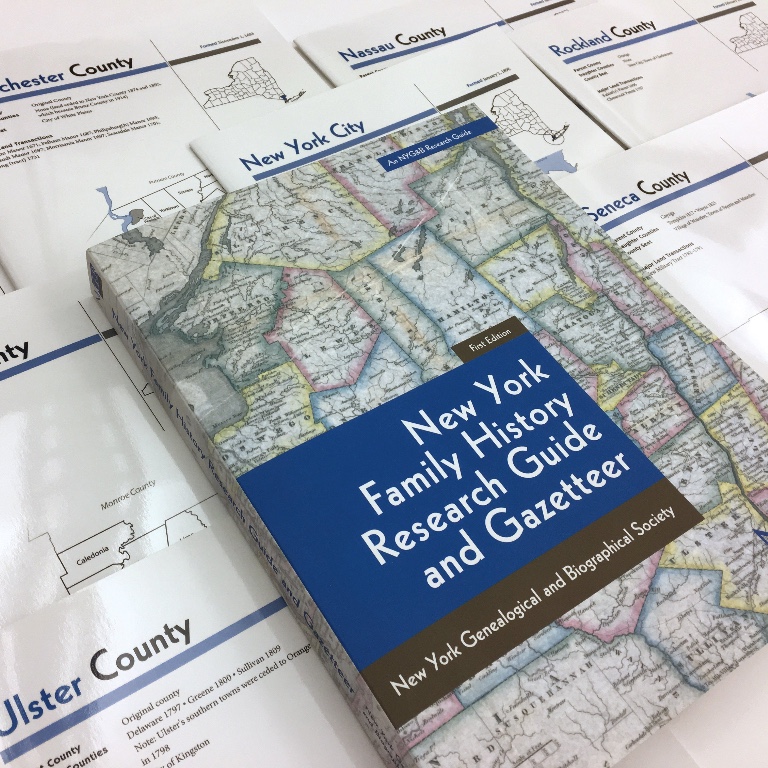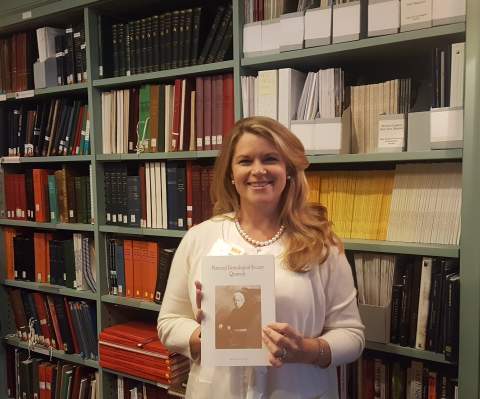Last month at our DNA and Family History Seminar, we interviewed Shannon Green, an NYG&B Member who has been working to improve her genealogical writing skills with tremendous success:
She has an article in the upcoming issue of The New York Genealogical and Biographical Record and has recently been published in the National Genealogical Society Quarterly and The Connecticut Nutmegger.

Not long ago, Shannon was a genealogist who didn't see herself as much of a writer. We are very thankful she took some time to talk with us - her story is an inspiration to our many members who aspire to take their genealogy and writing skills to the next level.
Read on to learn how she made the leap from beginner to expert and got published in several major journals along the way. Shannon also shares some excellent advice for those who want to improve their writing and maybe even get published in a top journal.
If you're interested in improving your writing skills, you can attend Write it up! A Workshop for Family Historians with Dr. Thomas W. Jones, this March in Syracuse, NY.
How did you first get into genealogy?
I'm actually relatively new to genealogy - I've been doing it for about seven years, since after my youngest was born. I got into it because I wanted to prove some family lore. The story was that three of our ancestors from South Carolina signed the Declaration of Independence - it turned out one of them did, so there was a little bit of truth to it, as there is with many of those stories. That's what started it, and then it became addictive - it's very stimulating and mentally rewarding!
I took a lot of online classes, which I really enjoyed. After a while, I felt like I sort of knew everything to know about genealogy, but I was very much self-taught in this way. Then in searching online for more formal courses and lectures, I discovered the Boston University Genealogy Program.
It opened my world completely - I was so glad it reached someone like me, who thought I knew what I was doing but had a lot more to learn. Before that I had never heard of genealogy institutes, never heard of the journals - I joined the NYG&B the first night to get The Record!
After the BU program, I went to my first conference, started joining local societies, and in general getting out of my office and into the world of archives, repositories, and libraries. For me, this was the gateway - it got me out from behind my computer doing it by myself, and brought me into the world of genealogy.
After you discovered this larger world of genealogy, what made you decide to pursue genealogical writing?
I never had the goal of publishing - I didn't really consider myself a writer.
I went to Duke for undergrad and Vanderbilt for my MBA, and after graduating, my work in mergers and acquisitions had little to no writing involved, so writing was a whole new thing for me. But for me, the idea of having something at the end of the day - a tangible product - is very appealing.
I also like to do DAR applications and other lineage applications. I know that if I can prove new ancestors, that opens that up to thousands of people who weren't eligible before. I consider it a mitzvah, a good deed, to give the world these lineages that anyone can link onto that weren't there before.
Actually, one of my bucket list genealogy items was to prove a new DAR ancestor, which I did this summer, so that was very exciting. Because the DAR lineages are all online, the more DAR I can do the more I can open up possibilities for other people.
One of the major ways I got into writing was by participating in a ProGen Study Group, which involved a lot of learning and peer review from other aspiring genealogists. One of the assignments we had to do was a proof argument, and this piece was what I wound up publishing in the NGS Quarterly this past summer.
How did you decide to submit your first piece to a journal?
Someone in the ProGen group recommended I submit the proof argument for publication, and I began thinking about submitting it to a local journal.
But then my husband suggested that I submit it to a national journal. I thought that a national journal wouldn't have any interest, but he pointed out that the only real risk was a polite rejection letter, so why not?
So I did it, and was kind of shocked every step along the way!
What was the publication process like?
It was such an incredible experience. In total, there were many, many people who provided input - between editors, proofreaders, peers, and mentors, - even though my name is on it, it benefited so much from the input of others, and that kind of learning process was so helpful for me.
Because I started the proof in ProGen, I was able to get a lot of input on it from my peers there, as well as our mentor, who is a Certified Genealogist. I also sent it to three genealogy friends as well. And then, of course, the NGS Quarterly, has a lot of editors and proofreaders as well.
How did you decide to continue writing and submitting articles to journals?
After my first was published, I attended the NYG&B's writing seminar, which was taught by Tom Jones. You're supposed to come to the seminar with a writing sample prepared, and mine involved two people of the same name, born in the same year and of the same county. Both families claimed that their ancestor was in the Revolutionary War, so I had to prove one was right and one was wrong, and explain where the error was.
I created this as a sample for the class, which taught me a lot about writing, editing, and improving work. After improving it throughout the course, I continued to work on it by applying what I learned when I went home and edited it. I then sent it to the Connecticut Nutmegger and it was published in the July issue of this year.
I also submitted my portfolio this summer to become a certified genealogist. I decided to submit one of the proof arguments I put together for my portfolio for consideration in The Record, and that will be published in the upcoming fall issue.
What advice do you have for someone who aspires to have their work published in a journal, or just to improve their writing for their own enjoyment?
I think group study like ProGen, which you can do from home, is a great tool. I love institutes and conferences, but I know it can be tough for many to get to where they are. If you can, those are great - particularly because you get to meet other people.
My own writers group, which I have mentioned - I refer to us as the three musketeers - we're all from that BU program and every month we check in with each other and talk about our goals. We edit each other's writing, and we've all since submitted to journals and have been published. One of us will be in the December issue of the NGS Quarterly. It's the connection with other like-minded genealogists and their peer review that has really raised my game.
As my father-in-law says, when you're in a room by yourself, you're the smartest person - so it was only when I was exposed to other people and other opportunities that I realized how much I had to learn. Reading the work of others and providing feedback is great - I have learned so much by providing feedback to others and evaluating their work.
One other piece of advice: At first I thought I wanted to do genealogy professionally, but after getting certified and trying it out, I just found that I didn't really like taking clients - it just wasn't for me.
But I have found that I really like the writing aspect, so I think it's important for people to realize that it's a great way to take your work to the next level and become serious without necessarily dealing with clients.
What's next? Is there more writing in your future?
Yes, I think so - I really enjoy it. I had three items on my genealogy bucket list, and they're now all done!
I got a new DAR patriot approved, I got published in one of the top journals, and I got my certification. So now I need to re-set my goals.
I do really like the writing, and I look forward to getting better and improving as I write more. I've had great editors, too which really helps!
Right now I'm focusing a lot on DNA and learning that - there's so much to learn!
We'd like to thank Shannon for taking the time to share her story with us, and hope you have enjoyed reading it. If you're interested in reading Shannon's latest article, keep an eye out for the Fall Record coming soon!
Here are the citations for her two other articles:
Shannon Green, “Parents for Cynthia (Parker) Wilcoxon of Ohio and West Virginia,” National Genealogical Society Quarterly, vol. 105 (June 2017): 93-100.
Shannon Green, “Thomas Painter and Thomas Welcher Painter of New Haven County, Connecticut: Which Man is the Revolutionary War Patriot?” Connecticut Nutmegger, vol. 50 (July 2017): 47-52.
About the New York Genealogical and Biographical Society

back-to-back Awards of Excellence from
the National Genealogical Society
in 2016 and 2017.
Since 1869, the NYG&B's mission has been to help our thousands of worldwide members discover their family's New York story, and there has never been a better time to join.
The cost of an Individual Annual Membership is less than six dollars a month, and includes the following benefits:
- Access to over 50 exclusive digital record sets covering the entire state of New York, including the fully searchable archives of The Record.
- A complimentary subscription to all of Findmypast's North American records, as well as U.K. and Irish Census records.
- Access to hundreds of expert-authored Knowledge Base articles and webinars to help you navigate the tricky New York research landscape.
- Exclusive discounts and advanced access to conferences, seminars, workshops and lectures to learn more about researching people and places across New York State.
To learn more or join us, please visit our member benefits page
Read More
-
New records added to the NYG&B eLibrary
-
Genealogy groups & community members unit to preserve access to records
-
Finding New York Birth, Marriage, and Death Records
-
Webinar: Using the NYG&B Website for Family History Research
